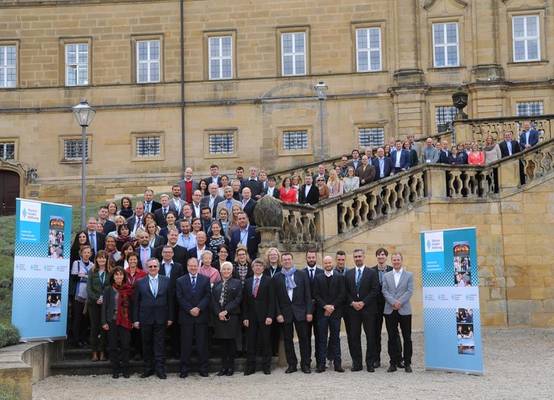Meeting of representatives of HSF – The Hanns Seidel Foundation worldwide
The HSS representatives in Banz Monastery
The conference started with an opening speech of Dr. Peter Witterauf, Secretary-General of HSF, on the current challenges of development policy. It was followed by two short comments by Gunther Beger, head of the department for questions of development policy, civil society, churches, industry and rural development at the Federal Ministry for Economic Cooperation and Development as well as Dr. Maike Thier from the planning department of the Federal Foreign Office. Both highlighted new challenges, such as the terrorist threat, the rise of authoritarian regimes in many parts of the world, mass migration, conflicts about resources and environmental issues. Finally Dr. Dietmar Ehm, Vice Director of the Institute for International Cooperation, looked at the problem of closing spaces for development work through laws restricting civil society activity in many regions of the world, e.g. Arabian and North African states and China. Afterwards, the commentators discussed with Dr. Susanne Luther, Director of the Institute for International Cooperation, and Dr. Stephan Klingebiel, head of the department of bi- and multilateral development policy at the German Institute for Development Policy, a public think tank.
The following day the meeting was opened by Dr. Susanne Luther. Dr. Stephan Klingebiel gave an introduction to the future of development aid. Prof. Dr. Jörg Faust of the German Institute for Evaluation discussed the importance of monitoring and evaluation for development policy and the implementation of development aid programmes. A vivid Q&A session on the challenges of monitoring and evaluation of projects of political foundations followed. The afternoon session started with an introductory statement by Dr. Dietmar Ehm on the role of the rule of law and human rights for political foundations. Afterwards, Michael Windfuhr, Vice Director of the German Institute for Human Rights, talked about the state of the debate on human rights and the rule of law, followed by a discussion.
Afterwards, three workshops explored aspects of the work of Hanns Seidel Foundation in the field of the rule of law, namely anti-corruption and transparency in projects, the role of constitutional courts in the system of law, and training in the field of law. These workshops, which led to the design of potential projects in the three fields, showed the scope and depths of projects of HSF throughout the world.
The third day of the HSF representatives meeting in Banz Monastery began with a strategic overview over the challenges of German development policy by Thomas Silberhorn MP, Parliamentary State Secretary in the Federal Ministry of Economic Cooperation and Development. In 2016 Germany so far has spent over eight bn. Euro in development funds, and funds have been continuously increasing in the last years, but challenges like climate change and the fulfilment of international development goals require even more funds. Raising funds, however, is as well the responsibility of donor states, but also the developing countries themselves, which have a hugely uneven performance in their fiscal policy. Regarding the potential for success of development interventions, it is important to have a comprehensive and systemic approach; in the past, too often isolated solutions for problems proved to be not sustainable. Capacity-building, good governance and the integration of IT into development concepts are necessary requirements for activating the sectoral and regional development potential.
The second presentation of the morning session dealt with the issue of the promotion of democracy and in particular parliamentary democracy. Ministerial Director Prof. Dr. Ulrich Schöler, Vice Director of the German Parliament Administration, which is itself consulting many Parliaments worldwide, looked into the role of Parliaments for developments, the importance of functioning Parliamentary administrations and the possibilities of international networking and cooperation with Parliaments. Afterwards, three workshops dealt with the possibilities and challenges of projects empowering women, youth and civil society.
The afternoon session started with a short introduction of federalism and the possibility of introducing federalism in a diverse context by Prof. Dr. Roland Sturm, professor of politics at Friedrich-Alexander-University Erlangen-Nuremberg. Afterwards, three workshops dealt with different aspects of decentralization and federalism, namely the strengthening of local administration, vertical sharing of power and the participation of population. Finally, in the evening the Chairwoman of Hanns-Seidel-Foundation, Prof. Ursula Männle, took time to talk to the conference about the future of HSF development policy.
The fourth day of the HSF representatives meeting in Banz Monastery began with meetings of the regional departments. In the department of Northeast Asia, the colleagues from China, Mongolia and Korea talked about perspectives of the works in the next years. Afterwards, a daylong meeting discussed the improvement of work of HSF regarding development strategies, implementation, finance and administration of projects.
The fifth and last day of the meeting was once again divided into four workshops, which looked into cooperation in the field of police work, climate and environment, vocational training and its societal and economic input and transnational and international networks.

